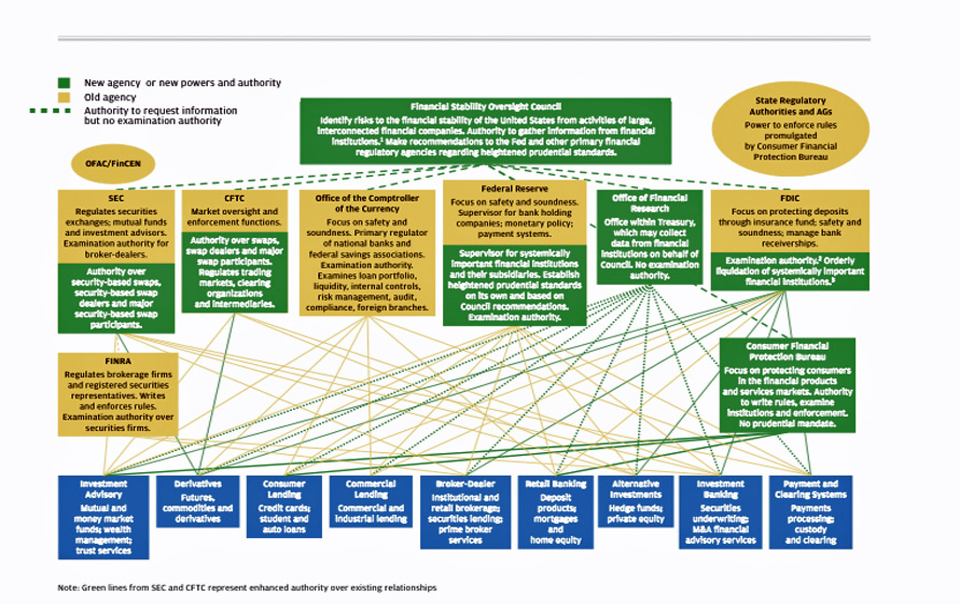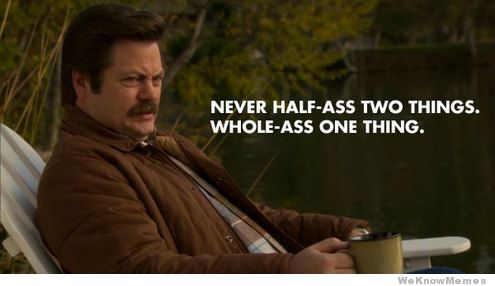In law, there are different silences.
When lawmakers set out to establish legal standards, they inevitably don’t address every contingency. There are spaces for flexibility, for breadth of application, for unforeseen developments, for the careful discretion required for sound law enforcement. There are always gaps.
Yet the gaps raise serious questions. Foremost among these is the problem of delegated lawmaking power. The United States Constitution vests the legislative power in a bicameral congress. Exclusively. Yet gaps, though inevitable and sometimes desirable, can result in leaks of this exclusive authority to non-legislative actors–police, prosecutors, juries, regulators, etc.
Take a classic example, when the National Industrial Recovery Act of 1933 gave the President authority to make”codes of fair competition” for slaughterhouses and other industries. That was more than a gap–that was a gulf. It’s one of only two laws that the U.S. Supreme Court has ever invalidated as an unconstitutional delegation of lawmaking authority to a non-legislative actor.
But at what point does a crack become a crevasse? During Justice Neil Gorsuch’s confirmation hearing, Senator Al Franken mocked the notion that any line should be drawn at all: “When Congress passes laws that require agencies to implement them, … those agencies turn to experts to develop those policies …. And I think that is a good thing. We want experts doing the work. What we Senators do not want to be doing is deciding … what the distance in the slats are in a baby’s crib.”
As with most statements made by politicians in confirmation hearings (or most anywhere else), Franken tilts at a straw man. But his example helps to highlight different types of legislative silence. On one hand, Franken is of course correct–a legislature needn’t and probably shouldn’t become entangled in minutiae.
But Franken fails to see that there are different kinds of silence. On the one hand, permissible gaps to be filled in by agencies and law enforcers involve conditional lawmaking where a certain legal requirement hinges on delegated fact-finding responsibilities. I’m a bit skeptical that we want Congress legislating safety standards for baby cribs, but let’s run with Franken’s example anyway. Congress might pass a law that requires crib manufacturers to ensure that crib slats do not pose a serious safety risk to occupants. It can leave an agency to determine the exact distance between crib slats requisite for child safety because the agency is making a factual determination (again, I’m not sure we need or want regulators doing this but bear with me). We’ll call this crib-slat silence.
Crib-slat silence is not an unlawful delegation of lawmaking authority. It simply commits to federal agencies the fact-finding responsibilities already inherent in the executive branch’s duty to “take care that the laws be faithfully executed.”
Crib-slat silence is different in kind from an unlawful delegation of lawmaking power. An agency is doing something quite different when it sets a safety standard for crib slats than when it establishes “codes of fair competition.” It isn’t simply a difference in the size of the silence; it’s a silence of a different kind altogether. Take, for instance, how President Roosevelt put together “codes of fair competition” under the broad power given him by the National Industrial Recovery Act. He let New York poultry butchers do it for him. Anyone with a basic understanding of public choice theory can appreciate how a business allowed to write the law that governs its competitors might go about this task.
To no one’s surprise, the codes of fair competition made life harder for minority business owners, in particular kosher butchers. Specifically, the code prohibited butchers from letting customers select the specific chicken they wanted–a part of at least some kosher practices in New York at the that time. The Schechters brothers, who ran a kosher butcher shop, were criminally indicted for letting a customer select an “unfit” chicken, among other things. The Supreme Court held this to be an unlawful delegation of lawmaking authority because the National Industrial Recovery Act didn’t just make application of a particular law contingent on executive fact-finding–it delegated the policy choices inherent in the legislative power. This type of silence we’ll call Schechter silence.
Schechter silence and crib-slat silence aren’t just different in terms of the relative size of the gap. Take, for instance, an example of a smaller instance of Schechter silence, where the silence is not quite so huge as “codes of fair competition,” but still has the essential quality of letting the agency make policy choices rather than find facts. The Environmental Protection Agency and the Army Corps of Engineers share regulatory responsibility over the Clean Water Act. The Army Corps has statutory authority to issue permits for polluting protected water bodies, and the EPA has statutory authority to veto those permits, even after they’ve been issued, if the EPA decides that the permitted activity will have an “unacceptable adverse effect” on the environment. The statute hasn’t delegated the authority to create a regulatory code from whole cloth, but it has delegated authority to make normative judgment calls, not just executive fact-finding. Determining whether a certain adverse effect is “unacceptable” is unavoidably subjective and calls for much more than establishing the existence of certain objective facts. “Unacceptable” involves the weighing of various competing interests–economic, environmental, etc.–and making a judgment, not based on facts, but on agency policy preferences. Note also, that the EPA can decline to veto the permit even if it does find an adverse effect to be unacceptable. Hence, while the EPA’s veto authority isn’t especially sweeping in its effect, it still is an exercise of legislative power.
On the other hand, crib-slat silence can authorize executive acts of great national significance, like tariff rates. In 1928, an importer challenged the president’s statutory authority to set tariffs as a delegation of legislative power. But the statute at issue required the president to set such rates based on a variety of factual determinations–not on what the president considered appropriate in his own judgment.
There’s yet a third silence. Rather than interstitial gaps in statutory language, this thrid silence is the vacuum where Congress has chosen not to speak at all. Sometimes, courts and agencies have mistaken this silence for crib-slat silence. That mistake can be a serious problem for the structure of sound government.
One example is the Department of Labor’s regulation of “tip pooling.” The Fair Labor Standards Act establishes federal minimum wage law. The law allows businesses to set their wages below the default minimum if the businesses use a “tip credit”–the deficit between the wage and the legal minimum is filled in with the employee’s tip money. If a business elects to use the tip credit, that business is prohibited from divvying up tip money among staff–you earn it, you keep it.
But the statute says nothing about prohibitions on tip-pooling for businesses that don’t take a tip credit. The Department of Labor didn’t like tip pooling, so it decided that the statute’s silence about tip pooling for non-tip-credit businesses was a delegation to the agency to do as it pleased. The Department of Labor promulgated a rule that extended the tip-pooling rule to all businesses, whether or not they took a tip credit. Incredibly, a federal court of appeals for the Ninth Circuit said this rule was just fine.
The silence extending outward from the edges of a statute are bookends, not blank pages. Hence, I’ll call this third silence bookend silence. The idea that an agency can simply promulgate rules to fill up this endless silence destroys our system of separated powers. After all, the clear implication of allowing the Department of Labor to fill in that silence is that the executive branch of government has a boundless and inherent law-making authority that can only be circumscribed if Congress expressly tells the executive branch “no.” This is essentially a reversal of the first two articles of the Constitution, vesting the Executive with lawmaking authority and Congress with what amounts to no more than a glorified veto. Yet this is precisely what the largest appellate court in the country allows.
There’s no doubt, of course, that the Executive does have some inherent authority to act without legislative imprimatur, in areas like foreign affairs. But those are expressly granted powers, or they’re necessarily implied. For instance, the duty to take care that the laws are faithfully executed necessarily implies the ability to hire staff, promulgate regulations for managing staff , law enforcement practices, etc. This is all quite different than filling in bookend silence, a free-floating power to extend statutory prohibitions beyond the express scope laid out by Congress, simply on the basis that Congress hadn’t said “here and no farther.”
In law as in life, silence can be a virtue. But federal agencies can turn it into a vice. That depends on the kind of silence we’re talking about. Conflation of crib-slat silence and Schechter silence or bookend silence has resulted in a flaccid judicial response to delegations of lawmaking authority. It would help if courts acknowledged distinctions between the types of silence statutes exhibit.




